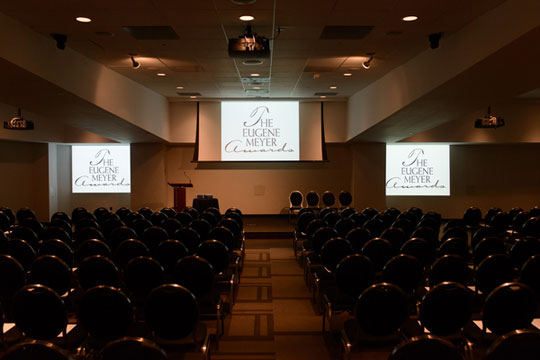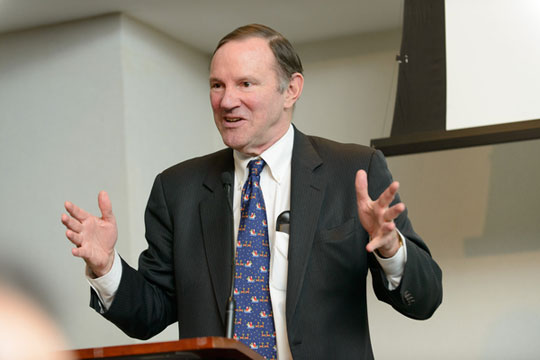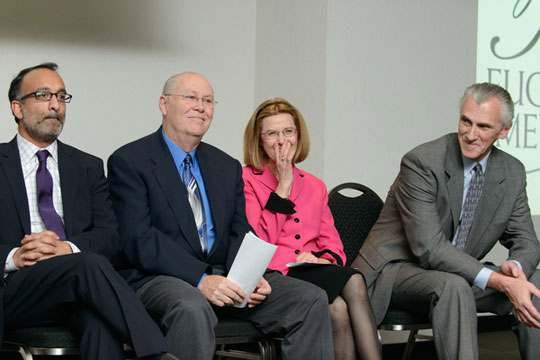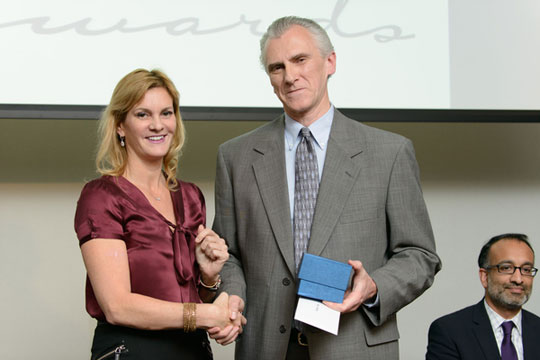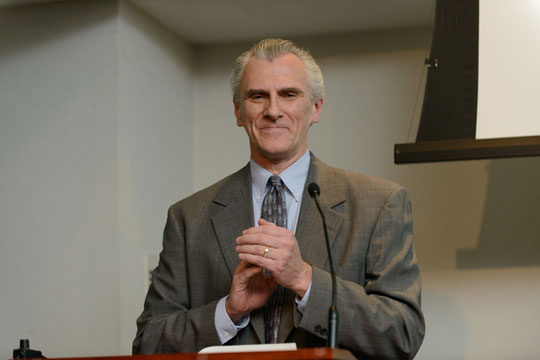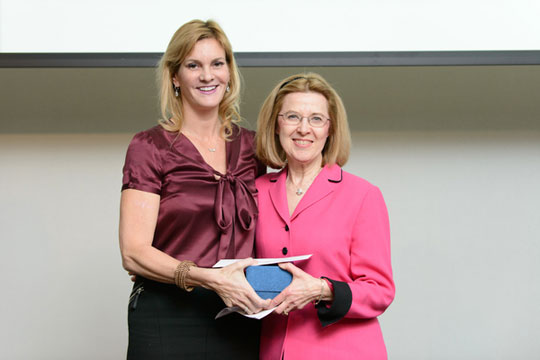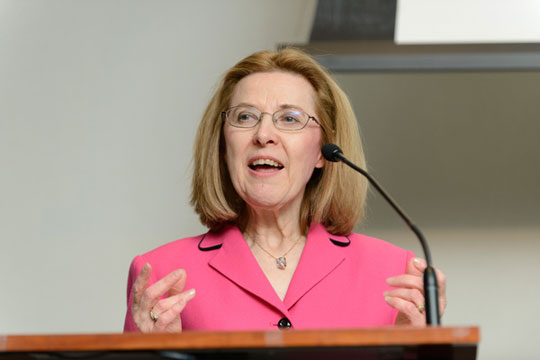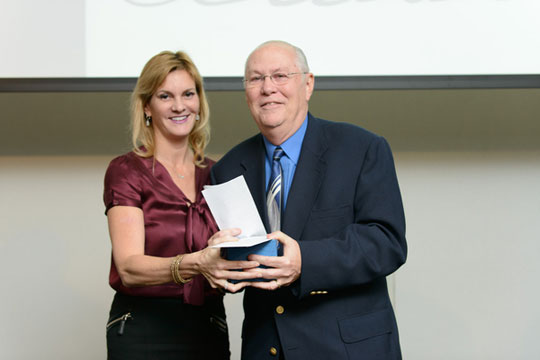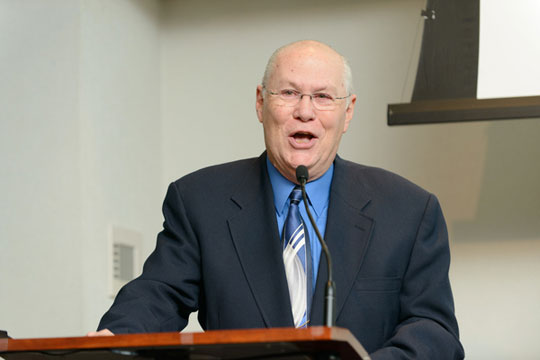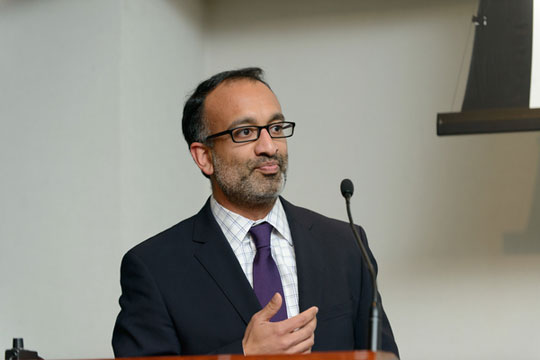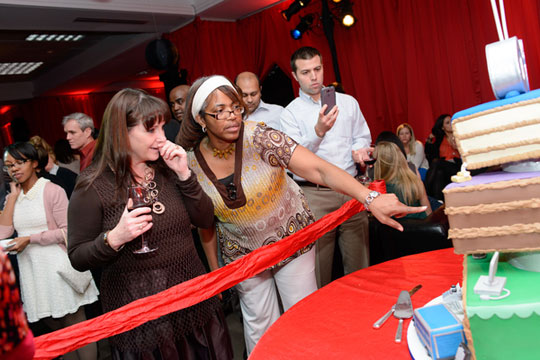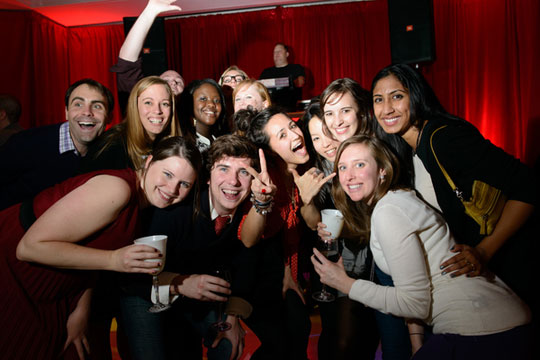2012 Eugene Meyer Award winners - View the photos
From Katharine Weymouth, Publisher, The Washington Post:
Please join me in congratulating this year's winners of the Eugene Meyer Award. This award is bestowed on people who have performed at the highest level in their field.
This year's award goes to these outstanding performers:
MEL HARMEL, IT: Since his very first project assignment nearly fifteen years ago, Mel Harmel has consistently been a key technical leader on The Post’s major IT system implementations. Mel initially was responsible for breaking new ground with an automated workflow system, TrackIt!, to support our complex ad operations process. He worked tirelessly to install that system successfully, and it’s been an integral part of our outstanding sales and service operations for over a decade
Mel was the Technical Architect throughout the enormous effort to install SAP as our primary advertising revenue system. Throughout that complicated implementation, Mel remained steadfastly focused on building solutions that solved business problems and met business requirements. Mel’s persistence, commitment, and hard work were driving forces in completing an extremely difficult project.
On the heels of completing SAP, Mel tackled the assignment of architecting and developing all the interfaces and integration to support PrePrint Microzoning. Once again, Mel’s efforts were critical to the on-time and successful launch of this important business process.
In recent years, Mel has been the primary architect in the middle of all the technical details of a long list of important projects and business initiatives. As one of Mel’s colleagues stated “Mel displays an uncanny knack for coming up with solutions that are fast, simple and effective” and this sentiment is shared by anyone that works with Mel on projects. Another colleague noted, "Even more noteworthy than Mel's technical grace, is the quiet manner he has in making sure that all the people are connected, as well as the pieces. He is focused on completing the task, not marking his own credit in the process."
In 2010, as the Methode implementation began, we once again turned to Mel for his technical leadership, hard work and high performance and enlisted him to join that important project. Mel has done a little of everything on the project. He also helped get that system live by serving as the Application Administrator during the first year in production.
Mel provides very broad and very deep technical knowledge to the IT Department. The biggest compliment we can give Mel is to say that he’s an engineer – a problem solver that also has tremendous business process knowledge and is not afraid to learn and master new technologies. Mel’s commitment is unrivaled, and he fearlessly and tirelessly takes on the most difficult and challenging assignments IT has to offer.
Mel’s work at The Post has embodied the ideals of the Eugene Meyer Award. His work consistently goes beyond what is expected, and it’s The Post’s honor and pleasure to present him this award.
DARLENE MCGIVERON, ADVERTISING: Darlene McGiveron is a glaringly obvious choice for the Eugene Meyer Award. She is an esteemed role model for reps across the floor, her love and passion for The Washington Post and its products, including digital and Express, has few peers, and the energy and commitment she gives to her job and to her clients, day in and day out, is comparable to an Energizer Bunny on Red Bull. For the past 30 years, Darlene has been focused, upbeat, and an ideal representative of our company.
Her clients, who for the past 15 years have been local education institutions in the DC metro area, love her, respect her, and rely on her industry knowledge to spend their budgets with us. Johns Hopkins, George Washington University, and American University are just a handful of the accounts that have spent millions of dollars with Darlene throughout her career. And, she used her client relationships to help Express get on its feet, when it launched. Education now represents one of the largest categories in our free daily publication, in huge part thanks to Darlene's building of the education marketplace in that product.
Watching Darlene on a sales call is a delight. She is overly prepared with any potentially needed sell sheet, back issue, or rate card, and whips out what she needs effortlessly during her high energy, excited explanations of all of the "nifty" things The Post can offer its clients. She also does a great job of being an earnest listener who tries to solve even the toughest challenges her clients face.
As a role model, Darlene shepherds her peers (and sometimes even her managers!) through the ins and outs of the education category, our products, our unique selling propositions, and they rely on her guidance and advice even when they are no longer "new." Darlene always makes time to help reps and interns and selflessly impacts her category of business, without neglecting her clients (there are many nights when she is here burning the late night oil).
Darlene McGiveron is highly deserving of the Eugene Meyer Award. Past Eugene Meyer Award winners will be honored to have her to join their ranks.
REX POTTS, PRODUCTION: Rex started at The Post in June of 1966, during the Johnson Administration. In the 46 years Rex has worked at The Post, he has exemplified, in his approach to his job, the standards of honesty, integrity and believing that hard work is rewarded with great results. He has embodied the standards that are the foundation of this business. He has set an example for everyone he has come in contact with over the near half century of his employment. He has instilled a work ethic in the Production department that will survive long past his time with The Post.
He was a Printer by trade and is probably the last guy working for us that could actually run the linotype machine in front of the building. Rex helped transition us from hot type to cold.
Rex left the Composing room to work with Kevin Conner to establish the quality assurance area of the Production department. This is where Rex started educating himself about newsprint by working with newsprint vendors, first on the print characteristics of the paper, then on runnability and transportation issues.
Rex is an expert in his field. He standardized the tracking of newsprint supplier performance so that The Post could quickly react to problematic newsprint which made the production process more reliable and predictable. He has educated, literally hundreds of pressmen and paper handlers, how to recognize and trouble shoot paper problems.
He belongs among the group of Production managers and employees that have been honored with the Eugene Meyer Award. He has left an indelible mark of professionalism upon everyone he has had contact with. He has no peers in the industry. He is the best Newsprint Manager in the country and the members of the Production department are proud to work with him.
NEWSROOM EMPLOYEES WHO HAVE COVERED THE AFGHANISTAN AND IRAQ WARS: When terrorists steered passenger airliners into New York’s World Trade Center and the Pentagon on a sapphire-clear September morning 11 years ago, a new epoch began in the history of this country—and The Washington Post. That attack begat wars that continue today, conflicts that have cost trillions of dollars and tens of thousands of lives. The Post has dispatched legions of reporters, photographers, editors, translators, fixers and other staffers to distant and dangerous places, in pursuit of our central mission—covering the news and our world with courage and sophistication, bringing clarity and understanding of these great and profound events to our readers everywhere.
We have lost friends and colleagues in the wars—among them Salih Saif Aldin, one of our deeply dedicated Iraqi staffers, who was shot and killed in Baghdad, and the brilliant Anthony Shadid, who won two Pulitzers for The Post in Iraq and died last year on assignment in Syria for The New York Times. The staffers who served long stints in the field, including Baghdad bureau chiefs Ellen Knickmeyer, Rajiv Chandrasekaran, Sudarsan Raghavan, Leila Fadel and Liz Sly, as well as Kabul bureau chiefs and correspondents Pam Constable, Josh Partlow, Ernesto Londoño and Kevin Sieff, have shown unshakable dedication and courage. The perils were omnipresent: Ellen was in our Baghdad bureau the first time it was nearly hit by suicide bombers; Leila and Ernesto narrowly missed injury the second time; Sudarsan more than once has been present when bombers have attacked nearby; Kevin and our Afghan colleague Javed Hamdard literally walked into a minefield while reporting a recent story in Afghanistan.
David Hoffman, who along with Phil Bennett and Doug Jehl ran our foreign-news coverage during these long wars, once likened covering conflict to staging a moon shot. It requires complex preparation and caution. You have to plan your security and constantly move with caution. Yet that hasn’t kept us away. We have sent literally dozens of journalists through training and then into war zones. Many of our colleagues have traveled to the front lines in both Afghanistan and Iraq and into other places where the Permanent War against terrorism now is fought. Steve Fainaru, who won a Pulitzer for his coverage of private contractors in Iraq, did painstaking investigative work in a war zone. Rajiv spent months slogging with the Marines through Helmand province, Afghanistan, accompanied by photographer Andrea Bruce, and wrote a book on each war. Keith Richburg and photographer Lucian Perkins traveled snow-covered paths into Afghanistan on horseback. Medical writer David Brown and photographer Linda Davidson followed the horrific challenges facing doctors in distant theaters of war, coping with the massive wounds caused by roadside bombs, perplexing symptoms arising from brain injuries, depression induced by combat. Compassion is a hallmark of our coverage: Greg Jaffe, who is known for his empathy for enlisted soldiers and mid-level officers, eloquently described the human tendrils between life on the battlefield and life at home. In a single line, he conveyed so much: “The wars came to the Nationals baseball game, as they always do, in the third inning.”
For their courage, their willingness to endure hazards, emotional hardships and physical challenges, all in the cause of reporting the truth, I am pleased to bestow this year’s Eugene Meyer award on the many people from The Post’s newsroom who covered the wars in Afghanistan and Iraq.
Please join me in celebrating all these wonderful people!
Katharine Weymouth
Publisher, The Washington Post
